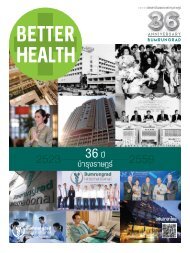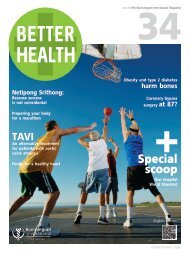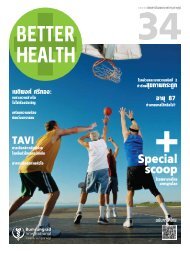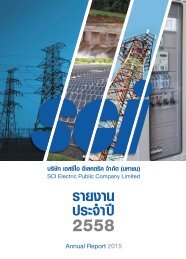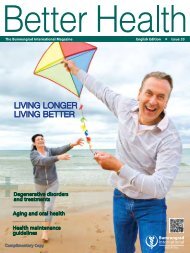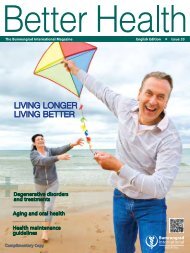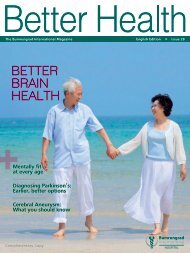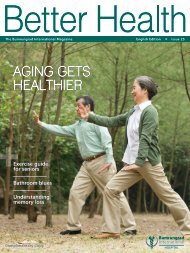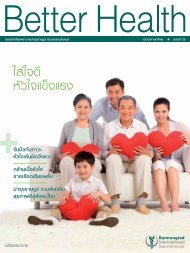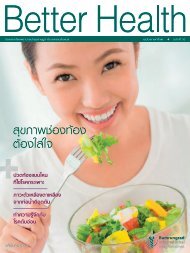All pdf BH Issue 33 Eng
Create successful ePaper yourself
Turn your PDF publications into a flip-book with our unique Google optimized e-Paper software.
M.D. FOCUS<br />
Get to know our doctors<br />
Meet four Bumrungrad physicians who share their thoughts on a range<br />
of healthcare topics.<br />
Providing the highest standards of patient care requires a hospital-wide commitment and professional expertise.<br />
Bumrungrad’s medical staff includes over 1,300 world-class doctors of the highest caliber, with outstanding<br />
professional credentials and advanced training across the full spectrum of medical sub-specialties.<br />
Prof. Dr. Chulaporn Roongpisuthipong, Physician specializing in Clinical Nutrition<br />
With over 30 years of experience treating malnutrition in patients and holding important<br />
leadership positions in the field of nutritional medicine, Prof. Dr. Chulaporn Roongpisuthipong<br />
is known as a skilled doctor and educator in nutrition management. Before joining<br />
Bumrungrad, she was the head of Nutritional Medicine at Ramathibodi Hospital Faculty<br />
of Medicine and was the chairperson of the Society of Parenteral and Enteral Nutrition<br />
of Thailand.<br />
Q: What poses the greatest<br />
challenge to a doctor of<br />
nutritional medicine?<br />
A: Educating the public on<br />
the importance of nutrition is the greatest challenge.<br />
Many people are suffering from malnutrition, but don’t<br />
realize it. There is no typical malnourished person. Both<br />
slender and overweight people can be nutritionally deficient.<br />
Malnourished patients, who have been treated with good<br />
practices, will have better outcomes and reduce the<br />
length of hospital stays. For example, elderly patients<br />
who spend long stretches in bed tend to become emaciated,<br />
but on the appropriate nutritional programs they are<br />
rejuvenated.<br />
I am pleased and grateful that Bumrungrad is addressing<br />
the problem of malnutrition and takes a leading role in<br />
helping patients deal with the issue. We have a strong team<br />
comprising nutritionists and nurses who assess the<br />
nutritional statuses of every patient and recommend<br />
specific programs to treat malnutrition.<br />
Q: What medical situation has left the most enduring<br />
impression on you?<br />
A: It was the case of an elderly American woman who fell,<br />
causing multiple fractures, and unfortunately, was also blind.<br />
She was critically underweight, only about 40 kg, and also<br />
had pancreatitis. As I formulated a personalized diet, her<br />
condition quickly improved. If we had not provided nutritional<br />
care, her injuries would have taken a much longer time to heal.<br />
Q: What’s it like working at Bumrungrad?<br />
A: Bumrungrad is one of the few hospitals providing the<br />
parenteral nutrition compounding service. Nutritional<br />
pharmacists are on call to formulate dietary supplements for<br />
individual patients in our TPN clean room. The TPN<br />
program’s high standards and good management system<br />
proves that Bumrungrad places high importance on patients’<br />
nutritional health.<br />
Dr. Nussra Wongrattanapasson, Dermatologist, specializing in Skin Aesthetics<br />
Dr. Nussra had graduated in Dermatology from the Faculty of Medicine, Ramathibodi<br />
Hospital, Mahidol University. She has worked at Bumrungrad for over 17 years and was<br />
the driving force in establishing the hospital’s renowned Skin Center (Dermatology). At<br />
present, 29 dermatologists are on staff at the Center.<br />
Q: Why did you join Bumrungrad?<br />
A: We at Bumrungrad are committed to the highest<br />
quality of patient care. <strong>All</strong> doctors have complete freedom<br />
in doing their work, honor one another, and do not see<br />
patients as mere customers. In complicated cases, our<br />
medical staff works collaboratively as a team, with specialists<br />
in different fields to help solve difficult cases. Working here<br />
gives me great pride.<br />
Q: What is most challenging about practicing<br />
dermatology?<br />
A: Gaining patients’ trust is the most challenging thing<br />
because people tend to think that skin diseases are<br />
insignificant and are only a matter of beauty. But that is not so<br />
with diseases such as skin cancer or epidermolysis bullosa.<br />
Q: How has dermatological<br />
technology changed in the<br />
last few years?<br />
A: It has changed a lot. Dermatological<br />
treatments include oral<br />
medicines, external drugs, intravenous<br />
injections, liquid nitrogen, and artificial ultraviolet<br />
light. These treatments are still in use, but the quality of<br />
drugs and equipment has continually improved. There<br />
are new and more efficient medicines that have fewer<br />
side effects. We now have skin-nourishing creams that<br />
greatly reduce inflammation, which means we can cut<br />
down on the use of steroids. There have also been advances<br />
in aesthetic treatment technology such as botox, filler,<br />
radio waves, and microwaves.<br />
16



